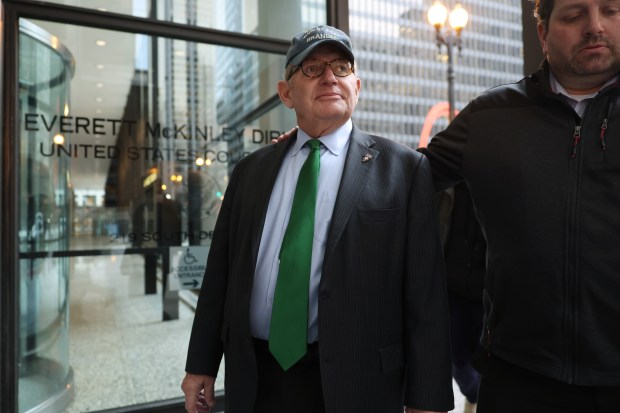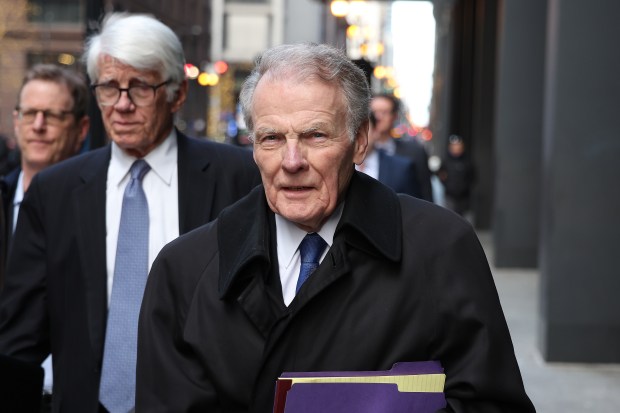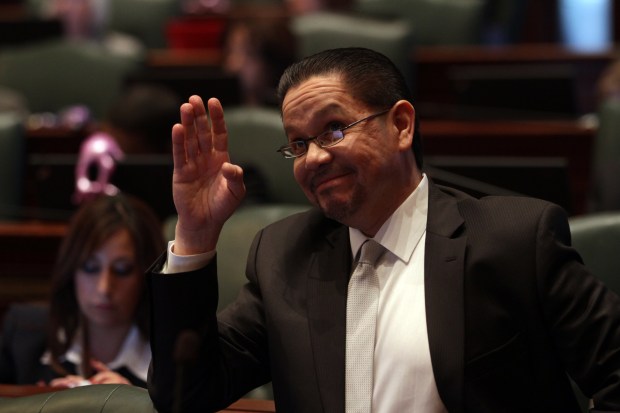Less than two weeks after AT&T Illinois’ bill to end mandated land line service became law in 2017, the utility’s then-president, Paul La Schiazza, allegedly received a request from a relative of House Speaker Michael Madigan to sponsor a non-profit event.
The requestor said the idea came “at the suggestion of our good friend, Mike McClain,” a former lobbyist and Madigan’s longtime confidant, according to a new prosecution filing. La Schiazza forwarded the request to a colleague in the legislative affairs department on July 12, 2017, writing “this will be endless,” according to the filing.
“I suspect the ‘thank you’ opportunities will be plentiful,’” the colleague allegedly emailed back, referring to the recent passage of AT&T’s coveted “COLR” legislation expected to save to company millions of dollars.
“Yep,” La Schiazza allegedly responded. “We are on the friends and family plan now.”
The email exchange, which was disclosed for the first time in a recent court filing, gets to the heart of the bribery case against La Schiazza, who is set to go on trial in September on charges he approved a scheme to funnel payments to a Madigan associate in exchange for the speaker’s help passing legislation important to the company.
The same filing, known as a Santiago proffer, alleged for the first time late last week that the landline bill was not the only piece of legislation where Madigan helped AT&T.
The then-powerful speaker was also directly involved in “small cell” legislation in 2017 that allowed companies like AT&T to put up micro-towers on light poles and elsewhere in public rights-of-way, according to the filing.
That fall, Madigan helped to advance the small cell bill during the veto session of the Illinois General Assembly, and in the spring of 2018, he helped defeat an amendment to the legislation that would have been harmful to AT&T’s interests, according to to prosecutors.
References to the small cell bill were also captured in FBI wiretaps, prosecutors alleged. In a call intercepted on May 16, 2018, for example, Madigan and McClain discussed the amendment that would have walked back AT&T’s gains.
When Madigan asked McClain if he was familiar with the legislation, McClain allegedly responded: “The small cell bill that, uh, you, you directed me to help them pass it last year, which I did do,” according to court filings.
“Yeah, yeah, yeah,” Madigan allegedly said.
Meanwhile, at the time La Schiazza was discussing the donation request from Madigan’s relative, AT&T had just agreed to pay $2,500 a month to former state Rep. Edward Acevedo, a onetime member of Madigan’s leadership team who’d recently left the General Assembly.
The payments to Acevedo — which allegedly were negotiated by McClain — were made via a lobbying contract between AT&T and Thomas Cullen, a former Madigan staffer and longtime political strategist aligned with the speaker, according to prosecutors. Acevedo who was a registered lobbyist at the time, did no actual work for AT&T in exchange for the payments, prosecutors alleged.
According to the new court filing, La Schiazza’s colleague with AT&T’s legislative affairs group highlighted in his email exchange “the connection between Madigan’s and McClain’s requests and AT&T’s legislative success.”
“There is a sensitivity in that office about us going away now that we got COLR,” the colleague wrote, according to the filing. “That is something to keep in mind in rest (of) 17 and in 18 regarding budget and profile with the Speaker’s office.”
La Schiazza allegedly responded he would “emphasize” that to the company’s leadership, “especially if we expect to pass a small cell bill.”
Shortly after the exchange, AT&T made the contribution requested by Madigan’s relative, a move prosecutors allege demonstrated that La Schiazza “knew AT&T’s responses to Madigan’s requests played a role in their legislative success.”
La Schiazza, 66, was charged in an indictment returned by a federal grand jury in October 2022 with conspiracy, federal program bribery, and using a facility in interstate commerce to promote unlawful activity. The most serious counts carry up to 20 years in prison if convicted. He has pleaded not guilty and has been free on bond while his case is pending.
La Schiazza’s attorneys did not respond to calls and emails seeking comment about Friday’s filing.
Acevedo pleaded guilty to separate tax counts stemming from the feds’ probe into Madigan’s operation and was sentenced to six months in prison.
But neither Acevedo nor Cullen has been charged with any wrongdoing in the alleged AT&T scheme, and both are on prosecution witness lists for La Schiazza’s upcoming trial.
Jury selection in La Schiazza’s case is scheduled to start on Sept. 9, just a month before Madigan and McClain are set to go on trial at the same Dirksen U.S. Courthouse on sweeping racketeering conspiracy charges that include the AT&T scheme as well as similar allegations regarding utility giant Commonwealth Edison.

Madigan had originally been scheduled to go on trial well before La Schiazza, but his case was postponed after the U.S. Supreme Court agreed to take up an Indiana case dealing with a federal bribery statute charged in Madigan’s indictment. That ruling is expected to come down in late June.
Meanwhile, the scheme to reward Acevedo, who is referred to in the court papers as “FR-1,” began in February 2017, after the company learned through McClain that the speaker was looking to kick Acevedo some money, according to the indictment.
In an email exchange that March, AT&T Illinois’ director of legislative affairs asked two of the company’s executives if they were “100% certain” they would get credit “from the powers that be” if the payments were made to Madigan’s associate.
“I would hope that as long as we explain the approach to McClain and (the associate) gets the money then the ultimate objective is reached,” one of the executives wrote back, according a statement of facts AT&T agreed to in court.
The legislative affairs director responded, “I don’t think (La Schiazza) wants this based on hope. We need to confirm prior to executing this strategy,” the statement said.
At McClain’s direction, AT&T employees then met with Acevedo to discuss a “pretextual” reason for the payments: to “prepare a report on the political dynamics of the General Assembly’s and Chicago City Council’s Latino Caucuses,” according to the statement of facts.
Acevedo never did any real work for AT&T Illinois, however. In fact, according to AT&T’s admissions in court, he balked at first at the payments, saying they were too low. But Acevedo agreed to the deal after McClain stepped in and said the amount was “sufficient.”
After a protracted fight, the landline bill passed during the final hours of the spring 2017 legislative session — with Madigan’s direct assistance, according to legislative records and the statement of facts agreed to by AT&T.
On June 29, 2017, Madigan permitted the bill to be brought to a vote and cast his ballot in favor of the legislation, records show. Two days later, after Republican Gov. Bruce Rauner vetoed the legislation, Madigan and the Democrat-led General Assembly overrode him, with Madigan again voting for the override.

Madigan, 82, was the longest serving leader of any legislative chamber in the nation who held an ironclad grip on the state legislature as well as the Democratic Party and its political spoils. He was dethroned as speaker in early 2021 as the investigation swirled around him, and soon after resigned the House seat he’d held since 1971.
Madigan and McClain were charged in March 2022 in the original 22-count indictment alleging they conspired to participate in an array of bribery and extortion schemes from 2011 to 2019 that allegedly leveraged Madigan’s elected office and political power for personal gain
The indictment also accused Madigan of illegally soliciting business for his private property tax law firm during discussions to turn a state-owned parcel of land in Chinatown into a commercial development.
Both Madigan and McClain have pleaded not guilty. Their attorneys have accused prosecutors of trying to criminalize legal political actions such as job recommendations in a quest to bring down the once-powerful speaker.
McClain is also awaiting sentencing in his conviction for bribery conspiracy last year in the “ComEd Four” case against him and three other ComEd executives and lobbyists.
Both AT&T and ComEd entered into a deferred prosecution agreements with the U.S. attorney’s office, admitting their roles in the schemes to influence Madigan in exchange for prosecutors dropping criminal charges. ComEd also agreed to pay a record $200 million fine, while AT&T was fined $23 million.
jmeisner@chicagotribune.com




